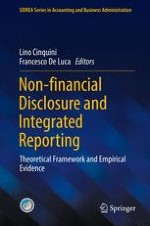
2022 | OriginalPaper | Chapter
Do Corporate Governance Mechanisms Affect the Non-financial Reporting Readability? Evidence from Italy
Authors : Adele Caldarelli, Alessandra Allini, Claudia Salvatore, Annamaria Zampella, Fiorenza Meucci
Published in: Non-financial Disclosure and Integrated Reporting
Publisher: Springer International Publishing
Activate our intelligent search to find suitable subject content or patents.
Select sections of text to find matching patents with Artificial Intelligence. powered by
Select sections of text to find additional relevant content using AI-assisted search. powered by